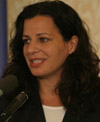| Home | Blog | Ask This | Showcase | Commentary | Comments | About Us | Contributors | Contact Us |

Intelligence reform isn't just about the chartASK THIS | August 224, 2004Counterterrorism expert Juliette Kayyem writes that when it comes to improving intelligence, the press should be asking less about bureaucratic shuffles and more about basic intelligence-gathering – and whether white guys make the best spies. By Juliette N. Kayyem Juliette_Kayyem@ksg.harvard.edu
Q. Who are we hiring as intelligence agents? Q. How are their qualifications assessed and promotions made? Q. What is the experience for minorities doing intelligence work? Q. Is the intelligence community altering its own personnel plans to address the new threats we now face? Infiltrating terror cells, or just living within the Arab and Muslim world without calling attention to yourself, which is what our on-the-ground intelligence requires, is difficult if you don't look the part. There wasn’t a single human intelligence asset inside Iraq before the war. Had there been, the U.S. might not have depended on men like Ahmed Chalabi, now an embarrassment, or foreign governments, whose information (and information flow) may be suspect. Much of the analysis of the failed intelligence relating to September 11, 2001, and the war in Iraq calls attention to bureaucratic architecture. The 9/11 commission's recommendations, as well as the counter-offer by President Bush, focus on it. They reflect what is in reality an American obsession with architectural reform. The creation of the Department of Homeland Security, a behemoth with no clear agenda, is the most recent and notable example of the concept. Fix the diagram, and the rest will follow, or so goes the theory. But it's a theory with shortcomings. For one thing, it seems obvious that regardless of the bureaucratic scheme, a more engaged national security adviser should have been able to focus intelligence resources – and the president – on the growing threats. In addition, the commission's conclusion – that there should be someone in the White House who is politically responsible for intelligence analysis – is likely to run counter to what the separate presidential commission investigating faulty intelligence in pre-war Iraq will conclude next year. After all, the big intelligence problem there was that too much political pressure was placed on those who should have been finding and analyzing objective data. Which brings us back to the question of whom we're hiring as agents. There has been too little focus on the makeup of our intelligence agents, the men and women who are actually gathering the information. How good are they? How much access do they have to terrorist groups? Does the composition of our intelligence community reflect the world – or suburban America? The truth is that the intelligence community is predominantly white. There have been efforts to diversify but they have come up relatively short. Most of the focus of what we might call diversity hiring has been on getting enough translators into the U.S. government. That is important – though the firing of over 30 translators under the Don’t Ask/Don’t Tell policy makes one wonder where our priorities are. Nevertheless, deciphering language is a skill that can be learned. There is another argument for diversity. Much has been said about changing hearts and minds in areas of the world that view us as the enemy. We need to engage in a massive public diplomacy effort to make that happen. A national security corps that looks more like the world would go a long way toward making the world believe that we identify with the struggle of others. These questions – how the intelligence and national security communities are recruiting, where they are recruiting from, and the experience of minorities in the CIA and other intelligence agencies – are worth asking. The architectural fixes are important but they will only go so far.
|
|||||||||||



